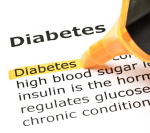
Is Diet Soda Sabotaging Your Diet?
 Low carb diets are designed to burn body fat by putting the dieter into benign dietary ketosis. To enter into a state of ketosis, most people will have to eat less than 40 grams of carbohydrates per day. Low-carb diets not only shed body fat pounds, they also shed tremendous amount of water weight and deplete the liver and body of glycogen reserves, a form of stored energy.
Low carb diets are designed to burn body fat by putting the dieter into benign dietary ketosis. To enter into a state of ketosis, most people will have to eat less than 40 grams of carbohydrates per day. Low-carb diets not only shed body fat pounds, they also shed tremendous amount of water weight and deplete the liver and body of glycogen reserves, a form of stored energy.
Anything that messes with your fluid balance or knocks you out of ketosis can cause a stall in weight loss — or worse, weight gain.
Here are five ways diet drinks can sabotage your best low-carb efforts:
1. Caffeine and carbonated drinks are less hydrating than water.
Caffeine, in higher amounts may act as a diuretic. Consuming four or more caffeinated drinks per day is considered “high” intake of caffeine. In larger quantities, caffeine can dehydrate you. Because low-carb diets shed water first, then pounds, your body needs more water to lose weight while in ketosis in order to burn and flush fat.
You might think because soda contains water you are “balancing” caffeine’s dehydrating effects with the fluid in diet sodas, but studies show caffeinated drinks and those that are merely carbonated (even decaf drinks) are less hydrating than water.
The fluid in diet soda is not handled by your body in the same way as water. If you hate water, try decaffeinated tea.
2. High sodium drinks can cause water retention.
You might be able to get away with drinking diet soda all day with other types of weight-loss programs, but low carb diets are naturally diuretic. Large intake of sodium (found in sodas) can cause water retention which can make it appear your weight has stalled.
3. Diet soda can increase hunger and cause fat storage.
Although caffeine is often touted as a mild appetite suppressant it also stimulates the brain and body and can have the opposite effect for people — especially in higher quantities, making you feel shaky, increasing the urge to eat.
Caffeine also increases a stress hormone called cortisol. Cortisol can lead to mood swings, which may trigger food binges because cortisol can lead to stronger cravings for fat and carbohydrates.
Sponsored Ad
High levels of cortisol can cause weight gain all by itself, and causes the body to store fat in the abdomen, which can make pre-diabetes harder to treat. People with Cushing’s Syndrome suffer from high levels of cortisol, which leads to the development fatty deposits especially on the upper back (causing a “buffalo hump”) and in the face (called “moon face.”)
4. Caffeine can increase stress levels and cause insomnia.
Studies have linked poor sleep with an increased risk of pre-diabetes, type 2 diabetes, heart problems, and even early death. Caffeine can cause insomnia for many, and it also increases certain stress hormones in the body including adrenaline.
When the body is stressed, your metabolism can slow down, making weight loss more difficult. Studies also have shown people who sleep less gain weight more easily, have a harder time taking it off, and tend to weigh more than people who sleep better, and longer.
5. Citric Acid can kick you out of ketosis.
Citric acid, another common ingredient in diet soda and other diet products, can stall weight loss for 40-50% of people who follow low carb diets. If you are sensitive to this substance it can slow down your weight loss by kicking you out of ketosis.
HCA (hydroxycitric acid) is a close relative of citric acid but some studies indicate it may aid in weight loss under certain conditions. HCA is an ingredient in the over-the-counter product “Hydroxycut.” Hydroxycut products are dietary supplements that are marketed for weight loss, as fat burners, as energy-enhancers, as low carb diet aids, and for water loss under the Iovate and MuscleTech brand names. Whether or not the product works, if you are taking it, any HCA in the product is not likely the cause of stalled weight loss.
The U.S. Food and Drug Administration (FDA) has warned consumers to immediately stop using Hydroxycut products by Iovate Health Sciences Inc., of Oakville, Ontario and distributed by Iovate Health Sciences USA Inc. of Blasdell, N.Y. Some Hydroxycut products have been associated with a number of serious liver injuries. Iovate agreed to recall Hydroxycut products from the market, which have since been reformulated.
Sources:
- Caffeine, Stress and Your Health. Elizabeth Scott, M.S. About.com
- Can too many diet drinks dehydrate you? LiveStrong.com
- FDA Warning on Hydroxycut Products. FDA.gov
- Cool Summer Beverages. Dana Carpender. HoldtheToast.com
- How Sleep Affects Your Weight. WebMD.com


